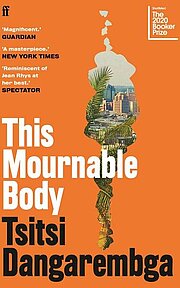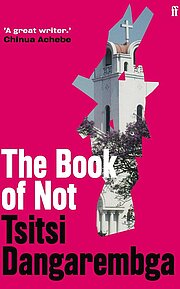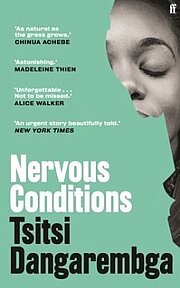The Foundation Board has chosen the writer and filmmaker Tsitsi Dangarembga from Zimbabwe as the Peace Prize winner of the year 2021. The award ceremony took place on Sunday, 24 October 2021, in Frankfurt's Paulskirche. The laudation was given by Auma Obama.
Statement of the Jury
The German Publishers and Booksellers Association has chosen to award the 2021 Peace Prize of the German Book Trade to Tsitsi Dangarembga. Zimbabwean novelist and filmmaker Tsitsi Dangarembga combines inimitable storytelling with a universally compelling perspective in a body of work that has made her not only one of the most important artists in her native land but also a popular and widely-recognised voice of Africa in contemporary literature.
In her acclaimed trilogy of novels, Tsitsi Dangarembga draws on the story of a young woman’s life from adolescence to middle age to depict the struggle for the right to live in dignity and the fight for female self-determination in Zimbabwe. In doing so, she reveals social and moral conflicts that go far beyond regional references, thereby creating the stage for the discussion of globally relevant questions of justice. In her films, she addresses issues that emerge from the clash of tradition and modernity. The messages she sends out via her work have successfully reached broad audiences both in Zimbabwe and neighbouring countries.
Tsitsi Dangarembga has long since complemented her artistic work with a rigorous commitment to fostering creative industries in her home country and, in particular, opening up culture to female creators. At the same time, she has also fought tirelessly for civil liberties and political change in Zimbabwe. Her most recent peaceful protest is aimed at corruption, and she has already faced prosecution by the government for her efforts. “If you want your suffering to end, you have to act. Action comes from hope. This is the principle of faith and action.”
The Award Ceremony
Greeting Karin Schmidt-Friderichs
Thank you for introducing me to Tambu, for giving me the opportunity to become one with her, for inviting me to understand Tambudzai’s sense of hopelessness, but also to witness her every attempt to get back up on her feet again.
Karin Schmidt-Friderichs - Greeting
Karin Schmidt-Friderichs
Greeting of the Chairperson
Laudatory speech Auma Obama
No matter how difficult it is – and we heard speak of this earlier – the fact is that in a foreign country, you have time to take a look at yourself, precisely because others are seeing you differently. You have time to question yourself: Who am I anyway? Precisely because other people are also trying to define you.
Auma Obama - Laudatory speech
Auma Obama
Laudation
Acceptance Speech Tsitsi Dangarembga
There will be no miracle cures for our errors of thought. What we can look to is to change our thought patterns word by word, consciously and consistently over time, and to persevere until results are seen in the way we do things and in the outcomes of our actions.
Tsitsi Dangarembga - Acceptance Speech
Tsitsi Dangarembga
Acceptance speech
Biography
Tsitsi Dangarembga, born on February 14, 1959 in Mutoko in present-day north-eastern Zimbabwe, is one of the most important writers, playwrights and filmmakers in her country. Her internationally successful trilogy of novels tells the story of a young woman striving for self-determination in post-colonial Zimbabwe and illustrates the complex mechanisms of oppression associated with gender, colonialism and racism. In 2018, her debut novel Nervous Conditions (1988) was included by the BBC on its list of the 100 most important books that have shaped the world. The 1993 film Neria is based on one of her stories and counts among the most popular films in Zimbabwe. Her latest novel This Mournable Body was shortlisted for the Booker Prize in 2020 and will be published in German in September 2021 under the title Überleben. In addition to her work as an author and filmmaker, Tsitsi Dangarembga has been active for many years in promoting freedom, women's rights and political change in Zimbabwe. In 2021, she received the PEN Pinter Prize as well as the PEN International Award for Freedom of Expression, which honours authors who continue their writing despite persecution. On October 24, 2021, she will be awarded the Peace Prize of the German Book Trade.
In 1961, two years after her birth, Tsitsi Dangarembga's family moved to England, where her parents pursued higher education. In 1965, they returned to Rhodesia, which declared independence that same year under a white minority government. In Old Umtali (now Old Mutare), Dangarembga’s father took over the directorship of a missionary school, where her mother then also worked as a teacher. Dangarembga had been enrolled in school in England, which meant that upon returning to Zimbabwe, she had to relearn her mother tongue, Shona, at the Hartzell Primary School in Umtali (now Mutare). In the capital Salisbury, present-day Harare, she attended Arundel School, a private girls' school, and graduated from high school. In 1977, she studied medicine at Cambridge, but dropped out after three years. She returned to Zimbabwe, which after years of political instability was able to hold free elections as a result of a peace agreement (Internal Settlement) and officially gained independence in 1980. After working for some time at an advertising agency, Dangarembga studied psychology at the University of Zimbabwe and became a member of the university theatre group. During this time, in an effort to expand the repertoire of roles for black women, she wrote her first plays, Lost of the Soil (1983) and She No Longer Weeps (1987). Her short story The Letter, published in 1985 in the anthology Whispering Land, was awarded third place by the Swedish International Development Cooperation Agency (SIDA).
*
In 1984, at the age of 25, Dangarembga finished her novel Nervous Conditions, the first part of her autobiographically influenced Tambudzai trilogy. After the manuscript was rejected in Zimbabwe, the book was published in Great Britain in 1988 and a year later in the United States. In Germany, the book first appeared in 1991 under the title Der Preis der Freiheit and was reissued in 2019 under the title Aufbrechen. Today, it is considered a classic of modern African literature. The novel, which won the Commonwealth Writers’ Prize (Africa Section) in 1989, centres on Tambudzai, a young woman who is also the protagonist of the subsequent books The Book of Not (2006) and This Mournable Body (2018).
The trilogy begins with Nervous Conditions in 1970s Rhodesia and describes the adolescence of Tambudzai, who is given the then unusual opportunity to pursue an education. As the daughter of an extended family living in the village shaped by the patriarchal structures of the rural population, she is initially fascinated by the opportunities now available to her. Soon she realizes that the dominant position of whites in society is not going to allow her to grow up as an equal. Tambudzai nevertheless sticks to her goal of becoming an educated woman, even though this threatens to erode her ties to her family, which is entrenched in tradition.
The Book of Not, the second part of the trilogy written by Dangarembga some thirty years later, tells of Tambudzai's further life. Here, the contradictions between her new life and the old one come to light. During the struggle for independence, in which her uncle, who is her benefactor, is tortured, and her sister loses a leg, Tambudzai flees her village, her family and her roots, volunteers to support the Rhodesian army but still does not find recognition despite her excellent grades. In Tambudzai's increasingly distorted perspective, from which the novel is written, reality takes a back seat to her own perception, preventing her from grasping her situation.
In the third book, This Mournable Body (Überleben in German translation), readers meet a middle-aged Tambudzai who lives in a run-down hostel in downtown Harare and has lost her job. With each attempt to rebuild her life, she is confronted with yet another humiliation. The contrast between the future she imagines and her daily reality is eventually so painful that it drives her to the brink of insanity. Disillusioned, she takes a job in ecotourism and returns to her family's village. This culminates in an act of betrayal and relentlessly reveals the links between colonialism and capitalism.
*
In the 1990s, Tsitsi Dangarembga turned her attention increasingly to the medium of film. She studied film directing at the German Film and Television Academy Berlin (DFFB) from 1989 to 1996 and produced several films in Germany. She also later drafted a concept for a doctoral thesis on the reception of African film at the Humboldt University in Berlin. In 1992, together with her husband Olaf Koschke, she founded the Harare-based film production company Nyerai Films, which she still runs today. The feature films and documentaries she has produced – and for which she has written the screenplay or directed – have been shown internationally and are among Zimbabwe's most successful. She returned there for good in 2000 and founded the International Images Film Festival for Women in Harare in 2002. As executive director of the African Women Filmmakers Hub and founder of the Institute of Creative Arts for Progress in Africa, she aims to strengthen sustainable creative industries in her country and on the African continent and, in particular, help young women become influential in the field.
*
In the course of her many years of political commitment, she appeared internationally as a speaker and belonged to various organizations. For example, she was a member of the Women's Coalition of Zimbabwe from 2011 to 2013, a member of the National Arts Council of Zimbabwe from 2010 to 2012, as well as a member of the National Aids Council from 2005 to 2009, and a member of the Zimbabwe College of Music from 2003 to 2009. She recently held a fellowship at the Stellenbosch Institute for Advanced Study and serves on the board of the Johannesburg Institute for Advanced Study, both in South Africa.
After protesting on social media against the arrest of journalists in Zimbabwe and calling for participation in an anti-corruption demonstration in late July 2020, she was detained for a short time like many other opposition figures in the country and released on parole. Nevertheless, she remains determined to work with the people of Zimbabwe to change conditions in her country: "Every moment is a moment for potential resolution. It just needs somebody to say, OK, we're going to do things differently."
Tsitsi Dangarembga and her husband Olaf Koschke live in Harare. Their children Tonderai, Chadamoyo and Masimba are studying abroad.
Awards
2021 Peace Prize of the German Book Trade
2021 PEN Pinter Prize
2021 PEN International Award for Freedom of Expression
2020 Shortlist Man Booker Prize (“This Mournable Body”)
2008 Council of Zimbabwe’s Arts Service-Prize
2006 UNESCO Children’s and Human Rights Award (“Peretera Maneta”)
2006 Winner Zanzibar International Filmfestival, 2006 (“Peretera Maneta”)
2006 Gender, Equality & Media Award, South Africa (“Growing Stronger”)
2005 Winner of Golden Dhow Zanzibar („Kare Kare Zvako“)
2005 Winner of Short Film Award Cinemaafricano Milano (“Kare Kare Zvako”)
2005 Short Film Award ZIFF (“Kare Kare Zvako”)
1989 Commonwealth Writers’ Prize- Africa Section („Nervous Conditions“)
Bibliography

This Mournable Body
Faber & Faber, London 2020 (orig. 2018), 384 Seiten, ISBN 978-0-571-35552-5

The Book of Not
Ayebia Clarke Publishing, Oxford 2006, 256 Seiten Faber & Faber, London 2021, 320 Seiten, ISBN 9780571368143

Nervous Conditions
Faber& Faber, London 2021 (1988), 304 Seiten, ISBN 9780571368129
Filmography
2013 Freestate (short film, screenplay)
2011 Nyami Nyami Amaji Abulozi (short film, screenplay and director)
2010 Ungochani
2010 I Want a Wedding Dress (feature film, screenplay and director)
2008 The Sharing Day
2006 Peretera Maneta - Spell my name (short film, production)
2005 Pamvura - At the Water (short film, screenplay and direction)
2005 Growing Stronger (documentary film, director)
2004 Kare Kare Zvako - Mother's Day (short film, director)
2004 High Hopes (documentary, director)
2002 Elephant People (documentary film)
2001 Ivory
2001 Hard Earth - Land Rights in Zimbabwe (documentary, with Olaf Koschke)
2000 On the Border (documentary, director)
1998 Zimbabwe Birds (with Olaf Koschke)
1996 The Puppeteer (documentary, screenplay and director)
1995 Everyone's Child (feature film, screenplay and director)
1995 Schwarzmarkt
1994 Passport to Kill
1994 The Great Beauty Conspiracy
1993 Neria (feature film, story)
Kare Kare Zvako (Mother's Day)
Laudation Auma Obama
Auma Obama was born in Nairobi, Kenya in 1960. In 1980, the sister of Barack Obama, 44th President of the United States, began her university studies in Germany on a scholarship from the German Academic Exchange Service (DAAD). She studied German languages and literatures, sociology and education in Heidelberg and also attended the German Film and Television Academy in Berlin. In 1996, she completed her doctorate at the University of Bayreuth with a dissertation on the topic of labour in German and Kenyan literature and culture.
Following the completion of her studies, Auma Obama worked for several years in Germany and the UK before returning to Kenya, where she worked on behalf of the aid organisation CARE International. In 2010, she founded the Sauti Kuu Foundation (Strong Voices Foundation), which has been active in Germany since 2012. The foundation works all over the world to foster disadvantaged children and adolescents, helping them to lead self-determined lives.
Auma Obama has received several awards for her social and humanitarian efforts – in particular for her work promoting economic, ecological and social sustainability – including the 2019 Walter Scheel Prize and the Hans Rosenthal Honorary Prize. She has been a member of the World Future Council since 2014. Auma Obama shares her deep commitment to social issues with Tsitsi Dangarembga, with whom she has been friends for many years.